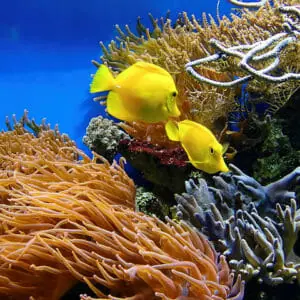
On February 24, 2020, the ASU Center for Biodiversity Outcomes hosted a presentation titled “The past, present and future of coral reefs,” by Assistant Research Professor Katie Cramer. Cramer’s presentation focused on her recent publication exploring a 3000-year record of coral reef degradation to investigate the role of human and natural disturbance.
Cramer is a marine conservation ecologist and Oceans Science Fellow at Conservation International. She joined the center in November 2019 as part of the ASU-Conservation International partnership.
Twenty people attended the presentation. During the talk, Cramer discussed the causes and degree of Caribbean reef decline through her continuous 3000-year record. Her research involved reef matrix cores that reveal the state of coral reefs over hundreds of years through the process of extracting deep coral sediment.
As she puts it, “Caribbean reefs are the worst off […] Climate change-related temperature stress, overfishing of herbivores, nitrification from land-based runoff and physical damage from hurricanes are all damaging our coral reefs.” Unfortunately, all of the listed stressors are directly linked to humans.
Most of the knowledge that scientists have gained from coral reefs has only been collected during the past couple of decades. This puts us in a dilemma, especially since research has indicated coral reefs have been declining long before the first coral reef studies in the 1970s.
Scientists like Katie Cramer are racing against time to reverse coral reef degradation, especially with predicted statistics revealing most coral reefs are expected to go extinct within a decade.